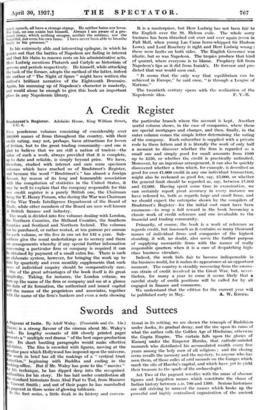A Credit Register
Bradstreet's Register. Adelaide House, King William Street, E.C. 4.
l'ivi ponderous volumes consisting of considerably over 100,000 names of firms throughout the country, with their ( redit rating, may not, perhaps, have attractions for lovers of fiction, but to the great trading community—and one is glad to believe that we are still a nation of traders—the value of such a work, always provided that it is complete, up to date and reliable, is simply beyond price. We have, therefore, studied with interest and care some specimen volumes which have reached us of Bradstreet's Register, and because the word " Bradstreet's " has almost a foreign flavour, by reason of its long and honourable association with the compilation of statistics in the United States, it may be well to explain that the company responsible for this new credit register is a purely British one, the Chairman tieing Sir T. Henry reason, who during the War was Chairman of the War Trade Intelligence Department of the Board of Trade, while other members of the Board are men well known in British finance and industry.
The work is divided into five volumes dealing with London, the Northern Counties, the Midland Counties, the Southern (unties and Scotland and Northern Ireland. The volumes mu be purchased, or rather rented, at ten guineas per annum fur each volume, or the five in one set for £42 a year. Sub- beribers give the usual undertakings as to secrecy and there are arrangements whereby if any special further information eoncerning a particular firm or company is required it can
obtained by payment of a small extra fee. There is such elaborate system, however, for bringing the work up to
e by quarterly and even monthly supplements that such Cases of individual enquiry should be comparatively rare. One of the great advantages of the book itself is its great uuplieity. Taking, for instance, the London volume, we m up the name of the firm or company and see at a glance e date of its formation, the authorized and issued capital d the names of the proprietors and associates, together ith the name of the firm's bankers and even a note showing
the particular branch where the account is kept. Another useful column shows, in the ease of companies, where there are special mortgages and charges, and then, finally, in the outer column comes the simple letter determining the rating of the company. Each subscriber is supplied with a private code to these letters and it is literally the work of only half a moment to discover whether the firm is regarded as a small one and simply good for small amounts from /100 up to £250, or whether the credit is practically unlimited. Moreover, by an ingenious arrangement, it can also be quickly discovered whether a firm which, for example, is described as good for over £1,000 credit in any one individual transaction, might also be reckoned as good for, say, £5,000, or whether the general limit should be regarded as, say, between £1,000 and £2,000. Having spent some time in examination, we can certainly report great accuracy in every instance we have referred to, both as regards large and small firms, and we should expect the enterprise shown by the compilers of Bradstreet's Register—for the initial cost Must have been enormous—to reap a full reward in the book becoming a classic work of credit reference and one invaluable to the financial and trading community.
Primarily, of course, the book is a work of reference as regards credit, but inasmuch as it contains so many thousand names of individual firms and companies of the highest standing, it will, no doubt, also serve the further purpose of supplying mercantile firms with the names of really responsible quarters when it is a case of despatching high- class business circulars.
Indeed, the work bids fair to become indispensable in the business world, for it makes its appearance at an opportune moment. The country is steadily recovering from the enorm- ous strain of credit involved in the Great War, but, never- theless, for many a year to come it seems likely that a careful study of credit positions will be called for by all engaged in finance and commerce.
We understand that the edition for the current year will










































 Previous page
Previous page